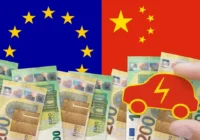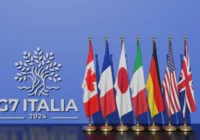After US President Donald Trump, in his tug of war with China over trade, formally accused Beijing of currency manipulation, the Chinese shot back with this message: “Today some in America are obsessed with American privilege to the point of destroying international rules and the international system … These Americans need to wake up!” The last sentence may simply be a more polite translation of saying these Americans need to grow up.
Here is today’s 3D definition:
American privilege:
A synonym for white privilege, as applied beyond the borders of the United States
Contextual Note
White privilege has been prevalent since the founding of the United States. American privilege came into being in the aftermath of World War II, at which time the US dollar seized the opportunity to dominate the world economy. Both forms of privilege have played a significant role in establishing and maintaining at least a semblance of world order. At the same time, it has always been considered politically indiscrete to mention either of them out loud, other than in the euphemism, “American exceptionalism.”
Everything changed when Trump became president. For the first time in over 70 years, a policy of explicit US domination (“America First”) has been paraded as the active principle that guides US actions abroad. At the same time, Trump’s obsession with borders has focused attention on the conviction many people have of the US as a white society that grudgingly admits other ethnicities into its culture, and only in limited numbers. Between the civil rights movement of the 1960s and Trump’s presidency, the unique politically correct representation of the US was as a multi-racial nation.
Trump’s assertiveness has changed all that. Whereas Republican officials at both the federal and state level have been working quietly and discreetly in the background to ensure white domination of both politics and culture, the Trump administration’s ostentatious battle to impose and enforce white domination at the border has advanced the question of white privilege to center stage.
Before Trump, Kansas Secretary of State Kris Kobach had already put in place a cleverly designed new form of technocratic manipulation to suppress minority voters from the electoral rolls based on their names. Crosscheck, the now notorious interstate voter registration database Kobach created, was finally exposed by investigative reporter Greg Palast. Kobach claimed it would prevent the same person cheating by voting in two states, but this turns out to be an extremely rare occurrence. In reality, Crosscheck was designed to remove tens of thousands of minority voters from the rolls on the grounds of similarity of their first and last names with someone else in another state. What could be more innocent or more politically and culturally invisible than building and exploiting a simple database?
Crosscheck was just one of a variety of techniques Republican state officials across the nation have been keen on implementing to replace the very visible practices of Jim Crow in the South that had been banned in the wake of the civil rights movement. In 2018, the Supreme Court in Shelby County v. Holder struck down part of the 1965 Voting Rights Act, thus granting states the latitude to devise new procedures for voter registration that could target minorities. The court reasoned that after several decades of civil rights reforms, the problem of racial discrimination had been definitively solved. Because white privilege had always been invisible, it was easy for the court’s majority to believe it simply didn’t exist.
Despite such laborious denials, official actions and decisions demonstrate that the defense of white privilege is clearly part of the fabric of the nation’s culture. Although the rapper Kanye West may be invited to the Oval Office to praise his narcissistic president — there will always be a place for talented blacks in US culture — “America First” means, above all, “White America First.”
Historical Note
When in their eagerness to exorcise the devils of two world wars, the nations of the world quietly accepted the notion of a “rules-based international order” engineered to allow the US to give direction to the global economy, they tacitly understood that both “white privilege” and “American privilege” were two pillars of the new world order. One of the rules required not talking about either form of privilege, possibly in the vague hope that the rules might one day also be applied to the US in a spirit of evolving equality.
Starting in the 1980s, the somewhat flexible rules-based economy evolved into the increasingly ideologically rigid neoliberal economy promoted by US President Ronald Reagan and British Prime Minister Margaret Thatcher. Games of power played out within and around — although also occasionally against — the shared diplomatic rules and proclaimed liberal social values that public personalities (politicians, business people, economists) made an effort to honor, at least in their rhetoric.
As has now become glaringly evident, the growth of inequality of wealth and income — and, more significantly, power — has overwhelmed the former intellectual commitment to equality. In economic terms, the now dominant neoliberal ideology has increasingly perceived yesterday’s shared “rules” as constraints inhibiting not just economic growth, but also the sense of uninhibited freedom those who control resources believe themselves to be entitled to. The financial, economic, political and cultural elite see themselves as a class of privileged but worthy managers of global resources. As a class, they have learned how to attract the admiration of the masses by freeing themselves from all shackles: legal (by maneuvering around the law), economic (as super-consumers) and, in many cases, moral (as sexual exploiters, if not predators).
Today’s privileged class is international, but unlike the ancient European aristocratic model of a supranational ruling class, the US, exercising its new global responsibilities, has for the past 70-odd years assumed the task of providing a replacement model that relies on talent and assertiveness, rather than inheritance or caste. One doesn’t have to be American to benefit from American privilege, but one has to accept the cultural leadership of the US.
Before Trump, both white privilege and American privilege were quietly honored and required no fanfare to convince people to fall in line. But the US empire had too many cracks and the US culture of individualism showed too little understanding of humanity’s social reality for the system not to show signs of weakness. As historian Alfred McCoy has argued, the US empire began an accelerated decline under George W. Bush, due principally to his foreign policy that pushed the idea of American privilege into a serious danger zone. At the same time, the neoliberal economic ideology fatally led to the Great Recession of 2008, further undermining the notion of American privilege.
Barack Obama attempted to restore order or at least the semblance of order, but by diffidently refusing to counter the existing trends, continued and confirmed the process of decline. Then came Trump, who effectively announced to the world that there is no point pretending the nation’s privileges are invisible. A true American believes that if you’ve got it, flaunt it. He has never stopped claiming that he’s got it and so he has never ceased flaunting it.
His followers think that’s normal. It’s the American way. But they also refuse to see it as a sign of privilege just as they refuse to admit that the US has constructed an empire. The rest of the world, of course, understands what Trump is doing and how dangerous it may become.
And now the Chinese, despite their culturally conditioned avoidance of contradiction and their commitment to harmony and saving face, have broken the law of silence about American privilege and have called Trump’s bluff.
*[In the age of Oscar Wilde and Mark Twain, another American wit, the journalist Ambrose Bierce, produced a series of satirical definitions of commonly used terms, throwing light on their hidden meanings in real discourse. Bierce eventually collected and published them as a book, The Devil’s Dictionary, in 1911. We have shamelessly appropriated his title in the interest of continuing his wholesome pedagogical effort to enlighten generations of readers of the news.]
The views expressed in this article are the author’s own and do not necessarily reflect Fair Observer’s editorial policy.
Support Fair Observer
We rely on your support for our independence, diversity and quality.
For more than 10 years, Fair Observer has been free, fair and independent. No billionaire owns us, no advertisers control us. We are a reader-supported nonprofit. Unlike many other publications, we keep our content free for readers regardless of where they live or whether they can afford to pay. We have no paywalls and no ads.
In the post-truth era of fake news, echo chambers and filter bubbles, we publish a plurality of perspectives from around the world. Anyone can publish with us, but everyone goes through a rigorous editorial process. So, you get fact-checked, well-reasoned content instead of noise.
We publish 2,500+ voices from 90+ countries. We also conduct education and training programs
on subjects ranging from digital media and journalism to writing and critical thinking. This
doesn’t come cheap. Servers, editors, trainers and web developers cost
money.
Please consider supporting us on a regular basis as a recurring donor or a
sustaining member.
Will you support FO’s journalism?
We rely on your support for our independence, diversity and quality.






